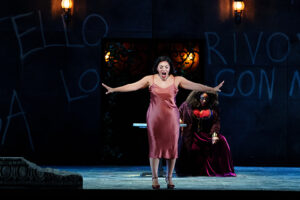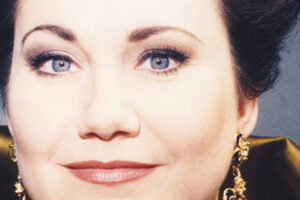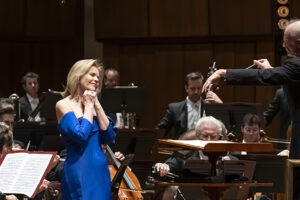

It’s easy to see why those early efforts were largely forgotten. Neither made much of an initial impression, nor did they leave behind a lot of evidence. In the case of The Day Before Spring , under consideration here, it more or less vanished after a Broadway run of 167 performances.
Happily, The Day Before Spring was in fact not lost forever. It would be too complicated to go into the search-and-rescue details of the script and score here, but suffice it to say that enough of it exists for Musicals in Mufti to resurrect a coherent version (actually more than that—two additional songs were imported in from What’s Up ), and present it with piano accompaniment.
By a stroke of good timing, I attended the show the same day I saw Call Me Madam at Encores!, which I previously reviewed here. Taken together, the two works offered a highly revealing lesson in musical theater history.
Call Me Madam , which in 1950 had been a fairly big hit (no small thanks to its star, Ethel Merman), is the more cohesive show, written by a team of veteran artists at the peak of their fame, displaying exactly what they knew how to do best.
In contrast, The Day Before Spring , while not exactly experimental, shows a young and adventurous team thinking both traditionally and out-of-the-box.
Watching the scrappy but delightful and endearing concert staging here, it was no surprise the show didn’t really make it in its original production. Frankly though, it’s hell of a lot more interesting than Call Me Madam .
The Day Before Spring is a tantalizingly mixed bag, with its creative team looking backward in the sense of cagily absorbing ideas from other shows of the time, while also anticipating at least a narrative device that today will resonate for many audience members.
Let’s take the latter idea first.
A very knowledgeable friend who had some acquaintance with The Day Before Spring pointed out in advance that it shares a central thematic element with Sondheim’s Follies. Indeed it does.
In brief, it tells the story of Katherine Talbot, whose 10-year college reunion is coming. She plans to skip it—married and settled in a comfortable if not thrilling relationship with her husband Peter, she fears what will happen if she meets her former college sweetheart, Alex Maitland, now the debonair and successful author of a bestselling novel/memoir called… yes… The Day Before Spring .
Ultimately, with Peter’s encouragement, they both decide to attend. (See what I mean about Follies ? There’s even the equivalent here of a “Don’t Look at Me” song, called “You Haven’t Changed at All.”)
Of course, The Day Before Spring doesn’t have the complex, essentially post-modern ambiguity and tonal mix we find in Sondheim, but I’m not sure what its tone is meant to be.
On the one hand, Lerner and Loewe provide the requisite mix of comic numbers (“My Love is a Married Man” is a particular winner), optimistic anthems (“God’s Green World”) and love duets (“I Love You This Morning”) expected of a musical in that period.
On the other hand, none of them works quite the way you’d expect, and there are clever surprises along the way. The title song, for example, evokes gorgeously romantic imagery—but it’s actually Katherine reading from Alex’s book. The show’s signature ballad, “This Is My Holiday,” intriguingly suggests both a full-throated paean to love and an ironic rejection of it:
This is the spring that never came;
This is the fire once more aflame;
This is the dawn that slipped away;
This is my holiday!This is the love I’ve waited for,
I heard the song of evermore
And now at last I’m on my way
This is my holiday!
But the number that really scores is a sublimely surrealistic ensemble that seems both a distillation of several popular musical theater tropes of the time and a true original.
When Katherine tries to figure out which is the right man for her (think Lady in the Dark ), she flees to the college library, where she encounters busts of three great thinkers: Plato, Voltaire and Freud. In a fevered daydream, she seeks their guidance. The sculptures come to life, and Lerner’s witty lyrics have each sage answering according to his profile:
PLATO
Your passion often may conceal
The fact your love is not ideal;
For perfect love is not cyclonic,
It be calm and just platonic.VOLTAIRE
Platonic love’s for a disciplinarian,
An infant child or an octogenarian.
To make love capriciously—to treat it as a feast
Is all that distinguishes a man from a beast.FREUD
Voltaire is smart, however,
He treats you as a wench.
Instead of being clever,
He’s merely being French.
“Katherine Receives Advice” on its own made The Day Before Spring worth seeing, but there’s quite a bit more. A full-scale resurrection of the show seems unlikely—it’s hard to imagine it recouping the investment. But it’s a quite wonderful oddity that deserves to be better known.
Musicals in Mufti did The Day Before Spring proud, with a terrific ensemble cast in which several performers scored special points. Madison Claire Park (Katherine) has a silvery soprano and looks like a film noir temptress; Jesse Manocherian (Alex) and Will Reynolds (Peter) captured both the silliness and sweetness of their characters.
Alyse Alan Louis (Christopher) brought vivacity and a clarion voice to the comic second lead—theater companies should recruit her for Carol Burnett’s musical roles.
One last comparison between the two events. More than 25 years into the Encores! series, their definition of concert stagings has expanded to a level that almost matches that of a full production. Musicals in Mufti’s resources are far more modest—yet the charm and talent of the enterprise won the day.
Photo by Ben Strothman.
























Comments